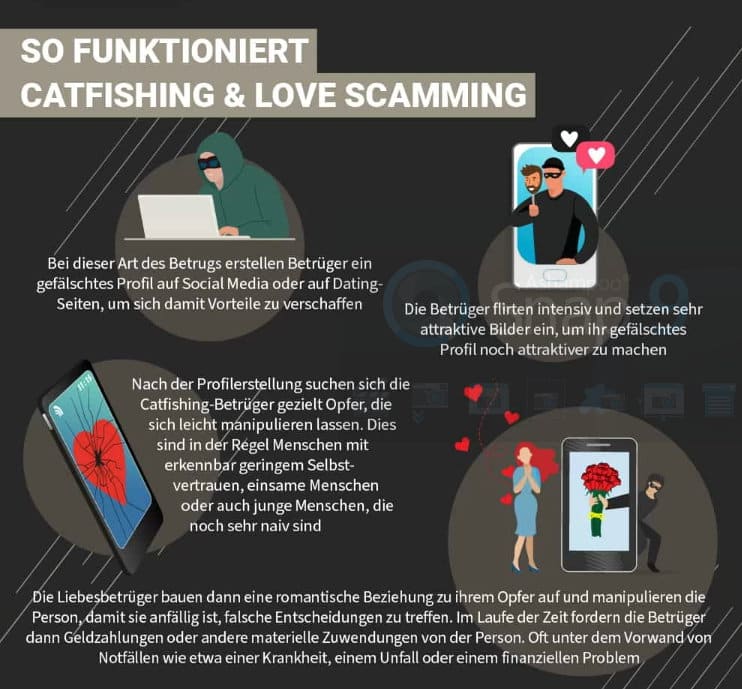In today's digital world where social media and online dating platforms are ubiquitous, catfishing become a widespread problem.
Catfishing refers to a form of online fraud in which someone uses a false identity to impersonate another person in order to gain social or romantic relationships or gain financial gain.
Although most people are aware of the risks of catfishing, many victims still fall for this scam. Why is that?
In this article, we will explore the psychological and social factors that make people vulnerable to catfishing. We will also explore how deception and manipulation are used in catfishing and the impact this scam has on victims.
Ultimately, we want to understand what can be done to raise awareness about catfishing and help people protect themselves from this scam.
Psychological and social factors that make people vulnerable to catfishing
One of the main factors that make people susceptible to catfishing is the desire for human interaction . In particular, people who are lonely or isolated are often looking for social contacts and are therefore more susceptible to catfishing. The desire for love and romance can also play a role. Catfishers often use romantic connections as a means to deceive and exploit their victims.
Trust and naivety are also factors that can contribute to susceptibility to catfishing. Many people have a basic trust in others' online identities and are therefore willing to share personal information and money with seemingly trustworthy people.
Lack of experience with online scams can also lead to people not recognizing the warning signs.
It is important to emphasize that these factors are not solely responsible for the victimization of catfishing. Most people who fall for catfishing are not naive or gullible, but have been cleverly manipulated.
Still, these factors can play a role and impact victims' ability to discern the catfisher's true intentions. It is important that people are aware of the risks and protect themselves by protecting their personal information and finances and using caution when seeking new social contacts online.
The Catfisher's Techniques
Catfishing is a method of deception and manipulation used by people to deceive others online. There are various techniques used by catfishers to deceive and exploit their victim.
Fake identities and fake profiles
One of the most effective techniques used by catfishers is the creation of fake identities and profiles. Stolen photos and information from other people are used or fictional personalities are invented. By using these fake identities and profiles, catfishers can also collect information to target and manipulate their victim.
Creating trust and bonds
Creating trust and bonds is another important part of catfisher tactics. They often use emotional manipulation techniques and respond to the needs and wishes of their victims. By doing so, they build trust and create a bond that allows them to carry out their plans.
The Impact of Catfishing on Victims
Catfishing can have a serious impact on victims, both psychologically and financially.
Psychological effects such as shame, anger and trauma
Victims of catfishing can feel betrayed and betrayed and experience shame, anger and trauma They may wonder why they didn't realize they were deceived and feel guilty even though they are actually the victim.
Financial impact such as losses and debts
In addition to the psychological impact, victims of catfishing may also financial loss and debt if they give money or personal information to the catfisher or pay for fake affairs.
It is important that people are aware that catfishing poses a real risk and that they should be careful when making new contacts online. Victims of catfishing should not feel guilty and should seek support to deal with the effects.
Tips and tricks to protect yourself from catfishing
Catfishing is a fraudulent practice that can happen anytime, anywhere. It is important to protect yourself so as not to become a victim.
Here are some tips and tricks that can help:
Verifying identities and information
One of the most effective ways to protect yourself from catfishing is to verify identities and information . For example, you can do a simple Google search to find information about a person. It is also advisable to check social media profiles and check whether they are fake.
Another helpful trick is to make video or voice calls
Avoiding quick commitments and financial transactions
< It's important to be careful when communicating with someone online. Creating bonds and relationships should not be rushed. Likewise, you should not engage in financial transactions or share personal information until you are sure you are dealing with a trustworthy person.
Conclusion
Overall, catfishing is a serious problem that can have both psychological and financial impacts on victims. It's important to realize that people are not always who they appear to be online. Therefore, we should beware of quick connections and financial transactions and always check who is behind a profile.
Training and campaigns can also help raise awareness of catfishing and strengthen communities to combat this type of fraud. Ultimately, it's important to stay mindful and vigilant to protect yourself from catfishing and interact safely online.



